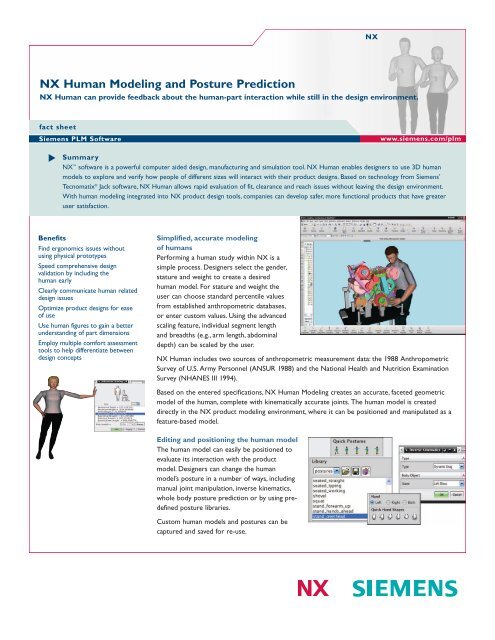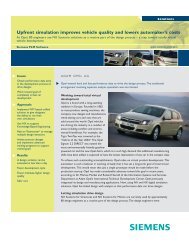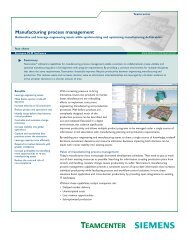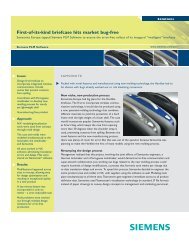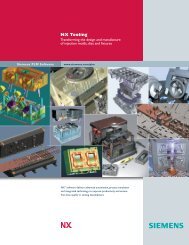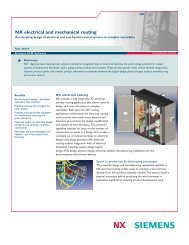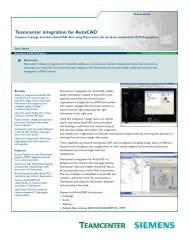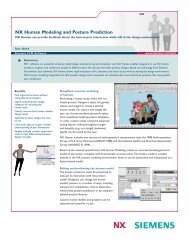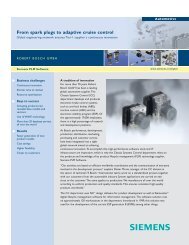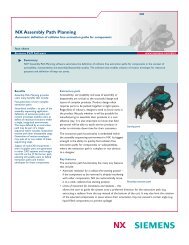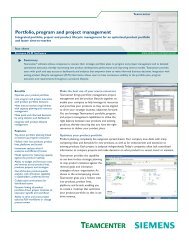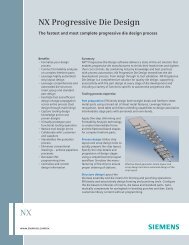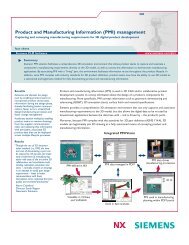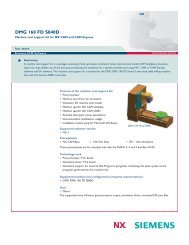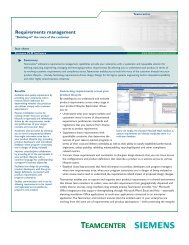NX Human Modeling and Posture Prediction
NX Human Modeling and Posture Prediction
NX Human Modeling and Posture Prediction
Create successful ePaper yourself
Turn your PDF publications into a flip-book with our unique Google optimized e-Paper software.
<strong>NX</strong><br />
<strong>NX</strong> <strong>Human</strong> <strong>Modeling</strong> <strong>and</strong> <strong>Posture</strong> <strong>Prediction</strong><br />
<strong>NX</strong> <strong>Human</strong> can provide feedback about the human-part interaction while still in the design environment.<br />
fact sheet<br />
Siemens PLM Software<br />
www.siemens.com/plm<br />
Summary<br />
<strong>NX</strong> software is a powerful computer aided design, manufacturing <strong>and</strong> simulation tool. <strong>NX</strong> <strong>Human</strong> enables designers to use 3D human<br />
models to explore <strong>and</strong> verify how people of different sizes will interact with their product designs. Based on technology from Siemens’<br />
Tecnomatix ® Jack software, <strong>NX</strong> <strong>Human</strong> allows rapid evaluation of fit, clearance <strong>and</strong> reach issues without leaving the design environment.<br />
With human modeling integrated into <strong>NX</strong> product design tools, companies can develop safer, more functional products that have greater<br />
user satisfaction.<br />
Benefits<br />
Find ergonomics issues without<br />
using physical prototypes<br />
Speed comprehensive design<br />
validation by including the<br />
human early<br />
Clearly communicate human related<br />
design issues<br />
Optimize product designs for ease<br />
of use<br />
Use human figures to gain a better<br />
underst<strong>and</strong>ing of part dimensions<br />
Employ multiple comfort assessment<br />
tools to help differentiate between<br />
design concepts<br />
Simplified, accurate modeling<br />
of humans<br />
Performing a human study within <strong>NX</strong> is a<br />
simple process. Designers select the gender,<br />
stature <strong>and</strong> weight to create a desired<br />
human model. For stature <strong>and</strong> weight the<br />
user can choose st<strong>and</strong>ard percentile values<br />
from established anthropometric databases,<br />
or enter custom values. Using the advanced<br />
scaling feature, individual segment length<br />
<strong>and</strong> breadths (e.g., arm length, abdominal<br />
depth) can be scaled by the user.<br />
<strong>NX</strong> <strong>Human</strong> includes two sources of anthropometric measurement data: the 1988 Anthropometric<br />
Survey of U.S. Army Personnel (ANSUR 1988) <strong>and</strong> the National Health <strong>and</strong> Nutrition Examination<br />
Survey (NHANES III 1994).<br />
Based on the entered specifications, <strong>NX</strong> <strong>Human</strong> <strong>Modeling</strong> creates an accurate, faceted geometric<br />
model of the human, complete with kinematically accurate joints. The human model is created<br />
directly in the <strong>NX</strong> product modeling environment, where it can be positioned <strong>and</strong> manipulated as a<br />
feature-based model.<br />
Editing <strong>and</strong> positioning the human model<br />
The human model can easily be positioned to<br />
evaluate its interaction with the product<br />
model. Designers can change the human<br />
model’s posture in a number of ways, including<br />
manual joint manipulation, inverse kinematics,<br />
whole body posture prediction or by using predefined<br />
posture libraries.<br />
Custom human models <strong>and</strong> postures can be<br />
captured <strong>and</strong> saved for re-use.
fact sheet<br />
<strong>NX</strong><br />
Features<br />
Accurate figure dimensions for fit<br />
<strong>and</strong> accommodation studies<br />
Task-based whole body posture<br />
prediction makes tool easy to use<br />
Reach zones are presented<br />
graphically <strong>and</strong> generated based on<br />
size of the human figure<br />
Seated comfort assessments aid in<br />
packaging design<br />
<strong>Prediction</strong> of driver <strong>and</strong> passenger<br />
postures respond to packaging<br />
layout, <strong>and</strong> is fully associative with<br />
<strong>NX</strong> design tools<br />
Reach zones<br />
<strong>NX</strong> <strong>Human</strong> <strong>Modeling</strong> creates reach zones that define the<br />
maximum reach boundary for the selected digital human. Users<br />
can specify locations at the fingers, elbows or shoulders, <strong>and</strong> the<br />
analysis can be based on full range of motion, or limited to<br />
postures within comfortable bounds.<br />
This feature is ideal for studying the accessibility of an object or<br />
target relative to the human. Reach zones can be dynamically<br />
linked (associated) to the human model so that the zone<br />
automatically adjusts when the human model is changed.<br />
Comfort Assessment<br />
The Comfort Assessment tool in <strong>NX</strong> <strong>Human</strong> helps you determine whether you’ve positioned your<br />
human model in a comfortable posture. Using the findings of recognized authorities on seated comfort,<br />
the tool predicts whether your human model is in a comfortable seated posture based on individual<br />
joint angles <strong>and</strong> overall body posture. You are given instant feedback about how the packaging design of<br />
your vehicle can affect the occupant’s comfort. There are several methods of reporting your findings,<br />
including real-time bar graphs that dynamically display comfort ranges <strong>and</strong> the ability to display results<br />
directly on the human model, using different colors to represent comfort ratings for each body<br />
segment.<br />
Packaging <strong>and</strong> availability<br />
<strong>NX</strong> <strong>Human</strong> <strong>Modeling</strong> is available as an add-on software module for <strong>NX</strong> Mach Series solutions.<br />
<strong>NX</strong> <strong>Human</strong> <strong>Modeling</strong> <strong>Posture</strong> <strong>Prediction</strong><br />
<strong>NX</strong> <strong>Human</strong> <strong>Modeling</strong> <strong>Posture</strong> <strong>Prediction</strong> extends the human analysis capabilities with automatic<br />
posturing <strong>and</strong> positioning of seated vehicle occupants. <strong>Posture</strong>s can be predicted for driver as well as<br />
front <strong>and</strong> rear passengers. Designers can specify h<strong>and</strong> <strong>and</strong> feet locations to accommodate specific<br />
vehicle layouts.<br />
The predicted postures are based on models of seated occupants developed as part of the Automotive<br />
Seat <strong>and</strong> Package Evaluation <strong>and</strong> Comparison Tool (ASPECT) program at the University of Michigan<br />
Transportation Research Institute (UMTRI). These models provide whole body posture <strong>and</strong> position<br />
prediction in response to the package configuration. Both class A <strong>and</strong> class B vehicles are supported, as<br />
well as input data from either the pre-<br />
ASPECT J826 physical manikin<br />
measurements, or the new post-ASPECT<br />
physical device.<br />
Packaging <strong>and</strong> availability<br />
<strong>NX</strong> <strong>Human</strong> <strong>Modeling</strong> <strong>Posture</strong> <strong>Prediction</strong><br />
is available as an add-on software module<br />
for <strong>NX</strong> Mach Series solutions. <strong>NX</strong> <strong>Human</strong><br />
<strong>Modeling</strong> is a prerequisite.<br />
Contact<br />
Siemens PLM Software<br />
Americas 800 498 5351<br />
Europe 44 (0) 1276 702000<br />
Asia-Pacific 852 2230 3333<br />
www.siemens.com/plm<br />
© 2008 Siemens Product Lifecycle Management Software Inc. All rights reserved. Siemens <strong>and</strong> the Siemens logo are registered trademarks of Siemens AG.<br />
Teamcenter, <strong>NX</strong>, Solid Edge, Tecnomatix, Parasolid, Femap, I-deas, Velocity Series <strong>and</strong> Geolus are trademarks or registered trademarks of Siemens Product<br />
Lifecycle Management Software Inc. or its subsidiaries in the United States <strong>and</strong> in other countries. All other logos, trademarks, registered trademarks or service<br />
marks used herein are the property of their respective holders. 10/08


